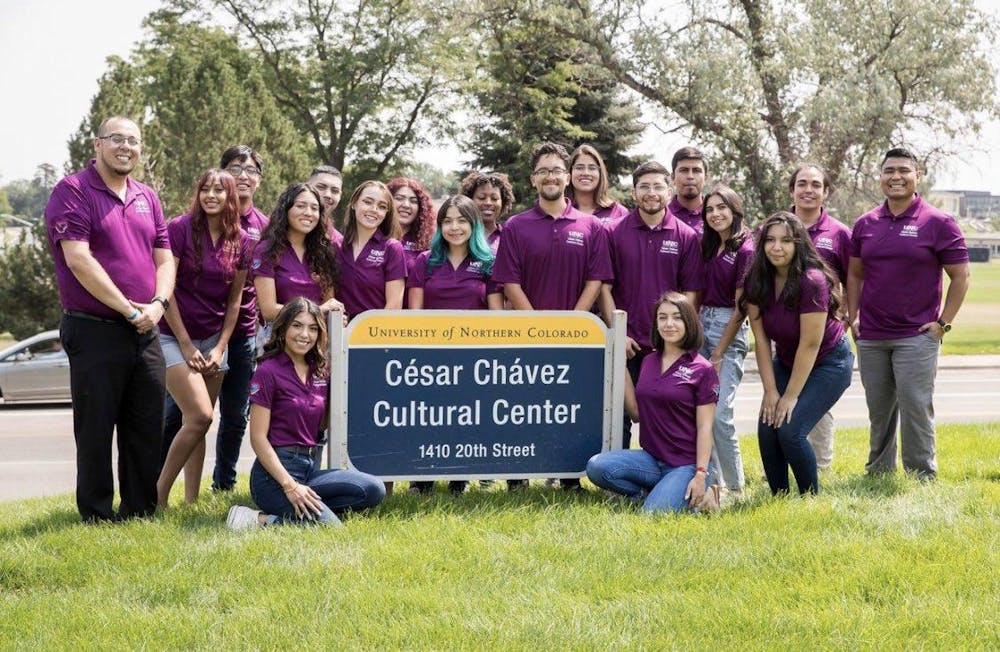The home away from home for Latine students at UNC will be celebrating 40 years of being on campus. Photo credit: @cesarchavezunco/X
College can be a scary place for many, and it can make one feel out of place among people they may have nothing in common with. The University of Northern Colorado provides many centers and outreaches for students of different ethnic backgrounds and even sexual identities. One in particular is celebrating their ruby, or 40th, anniversary for all the work they have done supporting Latine students on campus.

The César Chávez Cultural Center is the outlet for all the students on campus who are of Latine descent and can receive holistic support. Latine is the new gender-neutral term for those of Mexican heritage. Associate director Patricia Escobar, calls the center a home away from home for students.
“It’s a place to feel seen, valued, worthy of an education and for their identity as a Latine person as legitimate,” Escobar said.
The center provides that at-home feeling because it is a converted house that was made to fit the needs of the center. Inside there is a TV with a couch near the entrance, a computer lab and study rooms for people to work on homework or mingle with each other.
The study and conference rooms are also used for clubs and organizations like the League of United Latin American Citizens (LULAC) and Osos sin Fronteras (Bears without Borders) to meet.
Aside from the home-sweet-home feeling, those at César Chávez provide an abundance of support for students and families. Some of those services include financial assistance, help with registration, academic and emotional advising, work study and employment opportunities once a student graduates. The center also gives its support to the Greek organizations that are Latine based.
For Escobar, she has been at UNC for 30 years and has seen the Latine population at the school grow. When she first started, only 8% of the students were Latine. Now, that number has jumped to 28.4% of undergraduates and 16% of graduates.

During her time on campus, she has seen and experienced the impact her and the center's work has had on students.
“I’ve seen it with my own eyes… I have people making millions selling real estate. I have doctors, lawyers, counselors, teachers, accountants and pilots,” Escobar said. “It’s very satisfying to me to have been here this long and know students are making a difference in their communities.”
Escobar and the center's work doesn’t stop with the Latine population at school, as they try to foster unity in UNC by helping other centers and outreach programs on campus.
“We work closely with our colleagues," Escobar said. "We just collaborated with the Gender and Sexuality Resource Center on a film called Unidos as an attempt to bring students that share multiple intersecting identities together."
The CCCC have collaborated with almost all student services and cultural centers on campus. If any needed a helping hand at an event, Escobar and the crew would share their students as volunteers and help with the attendance.
With all of the things that Escobar does, she and a handful of others have been hard at work planning for a special gala. The reason? The César Chávez Cultural Center is celebrating its 40th anniversary.
On Oct. 30, César Chávez hosted a gala that included a mixture of 300 students and alumni that have been affected in a positive way by the center. The festivities included a band, photo opportunities, an open bar for alumni and a walkthrough exhibit of the history of the center.
The milestone is big, not just for Escobar, but for those who help keep the center running, and individuals who have been affected during their time on campus.
“It is probably the most important milestone I have seen in my tenure at UNC," Escobar said.
The impact of the César Chávez Cultural Center reaches far beyond the walls of its cozy house. It represents what is possible when students are given a place to belong. Escobar felt it herself when she came to UNC.
Escobar originally attended the University of Nebraska but stopped, feeling out of place. UNC made her want to jump back into the academic world after seeing the CCCC.
“I didn’t have a place like this. I took classes and went home and I did not feel part of the campus,” Escobar said. “It’s important to have representation. Students must be able to see themselves in their professors, in their administrators and colleagues at classes.”
As UNC continues to grow in diversity, the need for cultural and identity-based centers at other schools remains crucial. When students of every background and identity are supported, campuses become more inclusive, equitable and vibrant communities for all.






